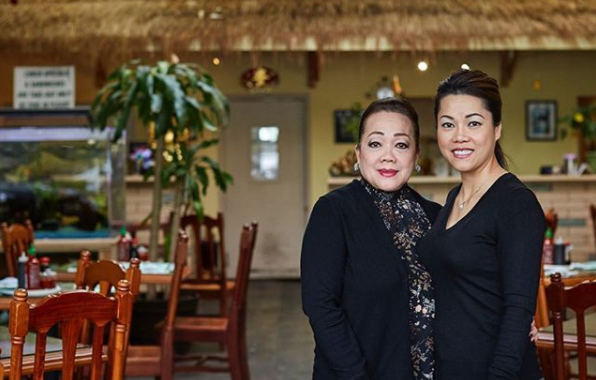By Carolyn Bick
NORTHWEST ASIAN WEEKLY

Taylor Hoang (right), owner of the Pho Cyclo Cafe restaurants, standing next to her mother Lien Dang, owner of Huong Binh restaurant in Little Saigon. (Photo from Ethnic Seattle)
When she opened her first restaurant more than 10 years ago, Taylor Hoang didn’t have to take out a loan. But, in her 20 years working in the city of Seattle, she and others have watched Asian Americans and other minority groups’ entrepreneurial dreams dashed, because they tried — and failed — to get one.
“It’s not something that has escaped people’s notice. Everyone knows [about it], and everyone is aware of it,” Hoang said.
Hoang is the president of Cyclo Restaurant Group, the parent company that covers three different Seattle restaurants and a catering company. She is also the executive director of the Ethnic Business Coalition, a nonprofit that works to promote immigrant- and minority-owned small businesses throughout the state of Washington. Along with Seattle’s Office of Economic Development and Craft3, a small loan nonprofit, Hoang aims to make it easier for minorities to get loans, and succeed in the businesses they begin.
Geographically, Hoang said, they plan to work within the city’s Chinatown-International District, in its most distressed neighborhoods. She said they chose this area, based on the businesses they had been working with for the last several years, as well as the community’s need for assistance.
Unlike a traditional, bigger bank, Hoang said the nonprofit will give smaller loans in amounts between $5,000 and $15,000. The idea isn’t to mimic a big bank — and besides, she said, big banks often have difficult hurdles minorities and immigrants have to surmount, before said banks grant a loan. For instance, most of the people with whom the nonprofit plans to work with may not have a credit history or a written business plan, both of which are key elements to getting a low-interest loan from a traditional banking institution.
“Minority business owners, usually, they are so busy running their business, they don’t always have all of the accounting paperwork,” Hoang said. “For them, rather than sitting down and going through all the paperwork for the application, they go with a really high interest rate from a lending institution.
“All the numbers are in their heads … so how do we put that on paper, to help them become bankable?” Hoang continued.
And this is where the nonprofit comes in. Rather than assessing a person’s credit score, Hoang said, the nonprofit will focus on whether or not the person pays their utility bills or rent on time. The loans won’t just be for people starting out, either. They will also be for people who are looking to expand their current business.
But the nonprofit’s work won’t stop, once a person has secured a loan. Instead, Hoang said they plan to work with the person, to make sure they not only succeed in their business venture, but can also work with bigger, traditional banking institutions, in the future — “kind of like holding their hands, so they can get to the next stage of accessing a larger pool of capital.”
“We can spend the next six months with them, to help their financial education, putting … their numbers down on paper, helping that structure,” Hoang said. “And if they have bad credit, help them clean up their credit. If they have no credit, help them establish credit.”
As for the number of people to whom the nonprofit plans to lend, Hoang said that depends on the capital they receive to start the nonprofit. She said they are working and looking at different organizations to approach for funding.
Though the group isn’t ready to disclose whom they may approach yet, Hoang said they are past the ideation phase, and are currently in what she called the “capacity-building phase.” This means the group is pulling together its research and data. Hoang said she anticipates it will take another six to eight months to begin feasibility studies for the project.
Carolyn can be reached at info@nwasianweekly.com.



